|

 |
WLS Center E-Newsletter
A
FREE publication from
http://www.WLScenter.com
Hosted by
Barbara Thompson
Author of:
Weight Loss Surgery:
Finding the Thin Person Hiding Inside You.
|
Issue #100 |
September
1,
2006 |
|
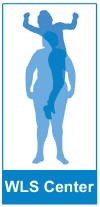 |

|
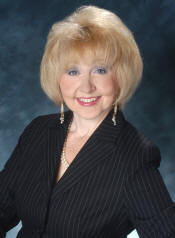
Barbara
Thompson
The Voice of Obesity |
Hello Everyone,
This issue of my newsletter is a milestone. It is my 100th issue.
The newsletter has grown over the years from once a month to twice
a month and to a readership of 9,624. It has allowed me to keep in
touch with all of you, to share what I know about life after this
surgery and to be a conduit for you to learn from each
other.
I thank all of you for your contributions.
Your emails inspire me. They tell me what your problems and
concerns are and they help to guide me in how I can help. For
instance, the Back on Track Program was born because so many of
you emailed me in your desperation because you were regaining
weight. The article in the Wall Street Journal and the soon to be
program on CNN about the link between alcoholism and weight loss
surgery came from this newsletter. And all of this ultimately came
from you. Thank you.
 |

|
In This Issue |
|
|
* Back on Track
* Research Article: Pouch Too Small?
* Retreat Report
* Please Pass the Veggies
* Obesity Action Coalition
* Insulin Resistance
* Recipe: Zucchini Beef Soup
* The “Chewable
Alternative”
*
Success Story: Michele Dunn |

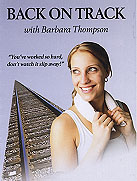 |
It's time to get Back On Track |
|
If
you’re not happy with your weight loss,
then join the
Back on Track with Barbara Internet Mentoring
Program.
Would
you like results like this?
“I am loving this Back on Track
With Barbara Program. It really does keep me on track.
I like having a new lesson each week, and practicing each of the
new steps in the lessons. I know I need constant encouragement
to keep the grazing under control. The low glycemic foods are a
wonderful help. Let's hear it for Barbara! I'm so glad she is
doing this work for us. This is a real need she is filling.”
Carole
New Jersey
For more
information or to join the Program, go
to
http://www.BackOnTrackWithBarbara.com |
|
|

 |
Research Article: Pouch Too Small? |
|
Dear Barbara,
I have been doing some research about gastric
bypass surgery, (i.e. procedures, risks, recovery etc) and I
cannot seem to find an answer to one question that I have. My
question is: what happens if the pouch is made too small?
From what I have read, the pouch should be 40cc (about the size of
an egg). Would there be any complications if the pouch is made
smaller than that?
Vicki
Hi Vicki,
The pouch really cannot be made too small. The pouch is left the
size it is for convenience so that you will be able to consume
more at a sitting and not have to eat quite so often. It is a
matter of quality of life. It is better nutritionally also, so
that you will consume enough to get in the nutrition that you
need. However if you were diligent with nutritional supplements,
and were willing to eat frequently, this wouldn’t be much of an
issue. Your food is absorbed in your small intestines. Your
stomach is just used for a sense of fullness and to help in the
digestion of food.
There was a recent article that
reported on research on pouch size. The research reported that
those with smaller pouches lost more weight. Here is a link to
the article:
http://www.medscape.com/viewarticle/531615
When I had my surgery 6 ˝ years ago,
pouches were made larger than what they are made today. Surgeons
have been reducing the size of the pouch over the years, with no
ill effects.
Actually, you can live with no
stomach at all. The following is from the American Cancer Society
website and refers to the removal of the stomach because of
cancer. However, the same would apply for having no stomach at
all for whatever reason. The complete removal of the stomach is
called a gastrectomy and here is what the American Cancer Society
has to say about it:
Total gastrectomy: This operation involves the total
removal of the stomach, and is recommended if the cancer is in the
middle or upper part of the stomach. If you have a total
gastrectomy, the surgeon will try and make a new "stomach" out of
intestinal tissue. Usually the end of the esophagus is attached to
part of the small intestine and some extra intestine is also
attached. This can make room for food to be stored before moving
down the intestinal tract, and will allow you to eat some food
before getting filled up. No matter how effective this is, people
who have a total gastrectomy can only eat a small amount of food
at a time. Because of this, they must eat more often. |

 |
Retreat Report |
|
I held my first retreat in Pittsburgh Aug.
18th to 20th and it was absolutely
wonderful.. It was more than I ever expected. We all walked away
from the retreat having insights into ourselves that we never
expected. We danced, laughed, cried, learned, and ate (but very
healthy food). But don’t take my word for it. Here is what the
attendees had to say.
- This retreat empowered me with love,
strength and peace of mind knowing I am not alone. I came away
from this retreat with more than I ever imagined that I would
obtain. I will always cherish this weekend.
Bonnie
- This retreat has been such a
wonderful and inspirational experience for me. I have met so
many special and loving people that I will cherish for the
rest of my life. You did such a wonderful job in covering the
issues we all share. Thank you so much.
Diana
- Helped me “see” and “listen” to my
inner self. I don’t do well with expressing myself, but this
was the most important event of my life.
Pamela
- Learning that we are all going
through similar struggles made me feel not so alone. It was a
great retreat with feelings of love, support and empowerment
prevalent throughout.
Cindy
- It absolutely helped me know that I’m
not alone in my struggles and need for support. Helped me meet
a wonderful group of women who will be a great support network.
Denise
- This retreat helped me feel great
about myself, to know myself and know I am going to be OK
.
Sarah
The women at this retreat became so close
over the weekend that they have formed a yahoo group so they can
stay in touch with each other.
I will be doing retreats around the country
based upon the responses that I received from the surveys. If
there is a large group from your support group that would like
for me to have a retreat and you think that there will be a
group of 30 attending, contact me at
Barbara@WLScenter.com and I will be sure to include you
in my future planning.
|

 |
Please Pass the Veggies |
|
We had several responses to last month’s article concerning ways
to eat as a vegetarian following weight loss surgery. They offer
some great suggestions. And even if you aren’t a vegetarian,
there are some terrific ideas about how to get more fruits,
vegetables, legumes and soy into your diet from the first days
post-op to your life long term. Be sure to click the bottom of
this article for more of the responses.
Dear Barbara,
I am more than 2 years post-op, and am a mostly a vegetarian. I
say mostly a vegetarian because I do not believe a person can
ever fully reach 100% vegan and a very important thing to me is
sharing a meal with others. Social eating plays a big role in
our society. Being post-op that can still be easily managed, but
being fully vegetarian is not as easily
done with others.
I have many vegan and vegetarian friends and much of the
information we share is for anyone. I can try to relate some of
my own experiences.
| A vegetarian
is one who does not eat meat, fish, or fowl, and subsists
on vegetables, fruits, nuts, grains, etc.
A vegan is a
vegetarian who omits all animal products from their diet
including eggs, milk and cheese. |
Let me first state how important it is that you discuss with
your surgeon and dietician that you are a vegetarian. As with
any post-op patients, it is important to take iron, calcium, B12
and multi-vitamin supplements.
For any vegetarian soy and tofu are vital and wonderful
products. The soy bean is one of the best sources of protein. I
would advise all people to work soy into their diet. Protein is
vital, and soy as well as soy protein powder are very rich in
meeting our protein needs. . There are a few vegetarians I have
met that are soy sensitive. This can be quite a challenge. For
those I recommend they seek several professional opinions to
help figure out a vegetarian lifestyle.
For the first few months post-op my blender and I became very
intimate. In today’s world we are hearing the advantages of raw
whole fruits and vegetables, but in my early days post-op, I did
cook vegetables, because we do have to treat our pouches like a
baby’s pouch. I would puree cooked squash, cooked sweet
potatoes, carrots as well as peas. Peas are actually a good
source of protein, I am not a broccoli fan, but I have heard
that if you cook broccoli to full tenderness and then blend it
that it is eatable. Greens like spinach when cooked and pureed
are doable. I would recommend this in moderation in the 6 to 12
month stage.
|

 |
Obesity Action
Coalition
|
Are you a compassionate weight loss surgery patient? If so, try
this compassion test:
- Do you know anyone who has had problems
getting their insurance approved for weight loss surgery? And
do you feel for them?
- Are you concerned about the prospect of
obesity in your own children?
- Do you see obese people on the street
and your heart goes out to them? Would you love to run up to
them and give them your surgeon’s card because weight loss
surgery has made such a difference in your life?
If you answered yes to any of these
questions, then you have passed the compassion test. You
are eligible for membership in the Obesity Action Coalition.
This is a wonderful association committed to education,
advocacy, and support on behalf of the obese.
|
I am very proud to
be a member of the
Obesity Action Coalition Board of Directors.
I urge you to learn more about the
Obesity Action Coalition and to join.
Here is the link for
more information
http://www.obesityaction.org |
|

 |
Insulin Resistance |
Dear Barbara,
I just came back from a new endocrinologist and he said I am
insulin resistant and that the excess insulin I produce gets
stored as fat. I told him I had gastric bypass surgery and I
don’t eat a lot and that I thought I had gained weight because
my old endocrinologist took me off my thyroid medications cold
turkey. Immediately after that I gained 30 pounds. Thankfully I
have been on your Back on Track Program and have not only
stopped gaining, but lost 7 pounds, due to the low glycemic
index way of eating you recommend and your inspiration. But the
way the doctor made it sound, it’s like if I don’t go on these
medications, I will never get to my goal weight. He was nice
enough to say I should not feel like a failure because there is
something medically wrong with me but I am not sure this is a
real illness. Then he said untreated it could lead to diabetes
and that scared me to death. If you know anything or can lead me
to someone who does, can you help me? Thanks,
AnnaHi Anna,
When we eat, our bodies break down food into compounds, one of
which is glucose. Glucose is important because it provides us
with energy, cell repair, etc. In order for our bodies to use
this glucose, it has to enter the blood stream and then go to
our individual cells. In order for this to happen, the pancreas
produces just the right amount of insulin that will move this
glucose into our cells.
When, for some reason, your blood
cells stop responding to insulin, glucose will build up in your
blood stream rather than going into the cells to be used. Over
time, this can lead to diabetes.
There are certain things you can do
to help your condition.
- Keep your
weight at a normal level.
- Exercise.
Walking 30 minutes a day or doing other types of exercise is
very important
- Eat a diet
high in fiber such as fruits, vegetables and whole grains
- If your doctor
feels you need medication, take it, or get a second opinion.
|

 |
|
Recipe:
|
|
Zucchini Beef Soup |
|
|
For my Pittsburgh retreat, the attendees traded favorite
recipes. Here is a great one from Pamela Matthews that calls for
zucchini which are abundant right now.
ZUCCHINI BEEF SOUP
1/2 pound ground beef
2 celery ribs, thinly sliced
1/3 cup chopped onion
1/2 cup chopped green pepper
1 can (28 oz) diced tomatoes, undrained
3 medium zucchini, cubed
2 cups water
1-1/2 teaspoons Italian seasoning
1 tsp salt, optional
1 tsp beef bouillon granules
1/2 teaspoon sugar
Pepper to taste
Shredded Parmesan cheese, optional
In a large saucepan, cook beef, celery, onion and green pepper
over medium heat until meat is no longer pink and vegetables are
tender; drain. Stir in the tomatoes, zucchini, water, Italian
seasoning, salt, bouillon, sugar and pepper. Bring to a boil.
Reduce heat; cover and simmer for 20-25 minutes or until zucchini
is tender. Garnish with Parmesan cheese, if desired. Yield - 6
servings.
Nutritional Analysis: One serving (prepared with lean ground
beef and without salt & Parmesan Cheese) equals 106 calories, 4 g
fat, 14 mg cholesterol, 628 mg sodium, 10 g carbohydrate, 2 g
fiber and 10 g protein. |

 |
| |
The “Chewable
Alternative” |
|
| I am happy to announce that we are
now providing you with a choice of nutritional supplements.
Bariatric Advantage provides the "Chewable Alternative" to our
regular drinkable supplements. Because of our alliance with
this company, we can now provide many additional products that are
dedicated to the bariatric patient that will lead to successful
weight loss and good health. Many products can be set up to have
automatic deliveries. Visit our new eStore
at
http://www.WLScenterestore.com and browse our different
Product Categories. You can order online, or call your order in
to our WLS Center representative at (800) 898-6888. |

|
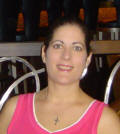 |
|
|
I want to offer a special thanks to Michele
Dunn. Here is her story: Dear Barbara,
After reading the awesome inspirational stories over the last three
years I decided it is time to share my story.
My name is Michele Dunn and I had RNY gastric bypass surgery on
April 16th, 2004. It was an incredibly long journey until
the surgery day but it was worth very second. I grew up with the
average weight concerns that every teenage girl experiences but I
managed to keep my weight under control until I turned 19 years old.
While I attended college my weight began to climb. I left for
college weighing 120 pounds but by the end of my freshman year I had
managed to pack on 60 pounds. I remember coming home for a weekend
that first year of college and my mother asking me, “What is going
on?” I didn’t know how to tell her that I secretly ate all hours of
the night and couldn’t seem to ever feel full. Clearly, I was trying
to fill a void that food was not capable of filling.
By my junior year in college I was severely depressed, had broken
up with my long time boyfriend and had dropped out of school. My
weight had climbed another 15 pounds. My self esteem was in the
toilet and nothing seemed to “fill me up”.
Shortly after dropping out of college I met my future husband.
With marriage came pregnancy and bed rest which brought with it
another 35 pounds. I am sure anyone that has found themselves
severely obese understands the struggle I was
experiencing….depression that leads to eating which leads to more
weight which leads to more depression. It is a vicious cycle that is
not easily broken.
Fast forward 11 years……I was a 34 years old, 338 pound single
mother who was watching her own daughter follow in her mom’s
footsteps. The truth is the love I felt for my daughter is what
possessed me to contact Dr. Somzstein at the Cleveland Clinic in
Weston, Florida.
My initial appointment was in October 2003. I clearly met the
requirements for surgery. I was suffering from diabetes; high blood
pressure, sleep apnea and the swelling in the tendons on the bottom
of my feet was almost unbearable. I fought the insurance company and
my employer for over six months but finally my surgery occurred. I
was blessed with my mother, grandmother and daughter praying for me
in the waiting room while I went through the 3 hour surgery. I am
sure the decision was the right one and that God was watching over
me in the coming months because I experienced very few side effects
compared to what I dealt with prior to the surgery.
Along with the confidence to take control of my health I also
found the strength to attack some other old demons in the “closet”.
I returned to school to complete my bachelor’s degree and I will
finish my MBA in March of next year. The truth was the surgery was
only a tool. I had to find the strength within myself to meet these
goals and accept an outstretched hand from family and friends.
I had to have my gall bladder removed a year after the RNY
procedure but otherwise I consider this surgery a “piece of cake”. I
am 138 pounds lighter and I look forward to doing a lot more
exercising when school is complete to lose even more weight. But I
feel like a new woman with a whole new chance to do things right
this time.
The most important thing I can offer those who are suffering from
the feeling that they are deprived after the surgery is a mindset I
maintain on a daily basis. “Everyone gets a certain amount of
‘M&M’s’ to eat in a lifetime and I just made a decision to eat mine
a whole lot sooner. In the end…we all had the same amount.”
Michele Dunn
mishi1969@hotmail.com
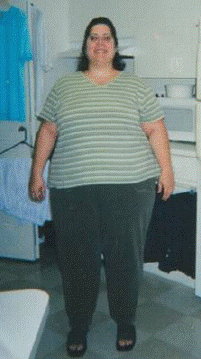 |
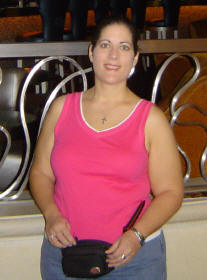 |
Congratulations Michele
|
|
You achieved your goal. Share your story.
Many people email me that one of
the parts that they like best about the newsletter are the
success stories. I can’t keep including them, if I don’t
receive them.
If you are 1 year or more
post-op and have before and after pictures, please send me
your story. Don’t worry about your writing ability. I will
make edits as necessary. Your story can serve as an
inspiration to others. Send your story to me at
Barbara@wlscenter.com
so that I can include them in a
future issue. |
|

 |
Attention Nurses |
|
If you are a nurse and would like for me to
speak on positive patient outcomes, patient satisfaction, or
obesity sensitivity for your State Nurses Association, please
have the conference planner for your State Association contact
me. I have a corporate sponsor who will pay my fee and expenses
so it is free for your Association. I also speak for many
hospitals on the same topics.
Contact me at
Barbara@WLScenter.com or 412-851-4195. |

|
Permission to
Reprint
|
|
You may reprint any items from this newsletter in your own print or
electronic newsletter. But please include the following paragraph:
“Reprinted
from Barbara Thompson’s free e-newsletter featuring helpful
information and research material to help patients succeed following
weight loss surgery.
Subscribe at
http://www.barbarathompsonnewsletter.com/ ” |

|
Subscription
Corner |
|
Did someone forward this newsletter to you?
Would you like to
receive a personal notification when it is
ready for you to read? It's simple! Just go to
http://www.barbarathompsonnewsletter.com/ and
scroll down to the subscription form. After filling out the form and
submitting it, watch for an email that asks you
to CONFIRM your subscription.
Your
subscription is not complete until we get this confirmation back!
If you like this newsletter, please
pass it on to your friends and family and have
them signup for our notification service.
Do you want to unsubscribe? Go to the
bottom of your newsletter notification email message and click the
unsubscribe link. You will be automatically deleted.
If you have any problems with this
process,
call our office toll free at (877) 440-1518. |

Copyright © 2000-2013 Barbara Thompson All Rights Reserved
|